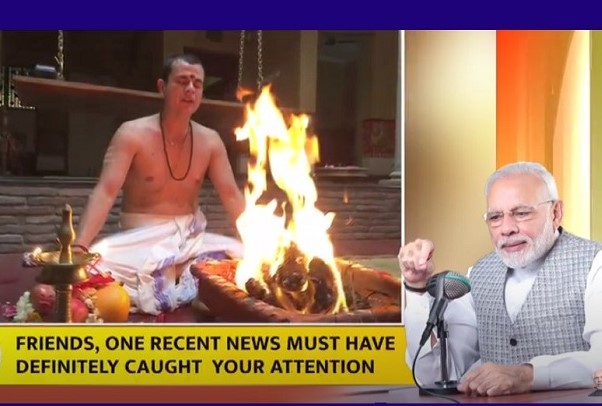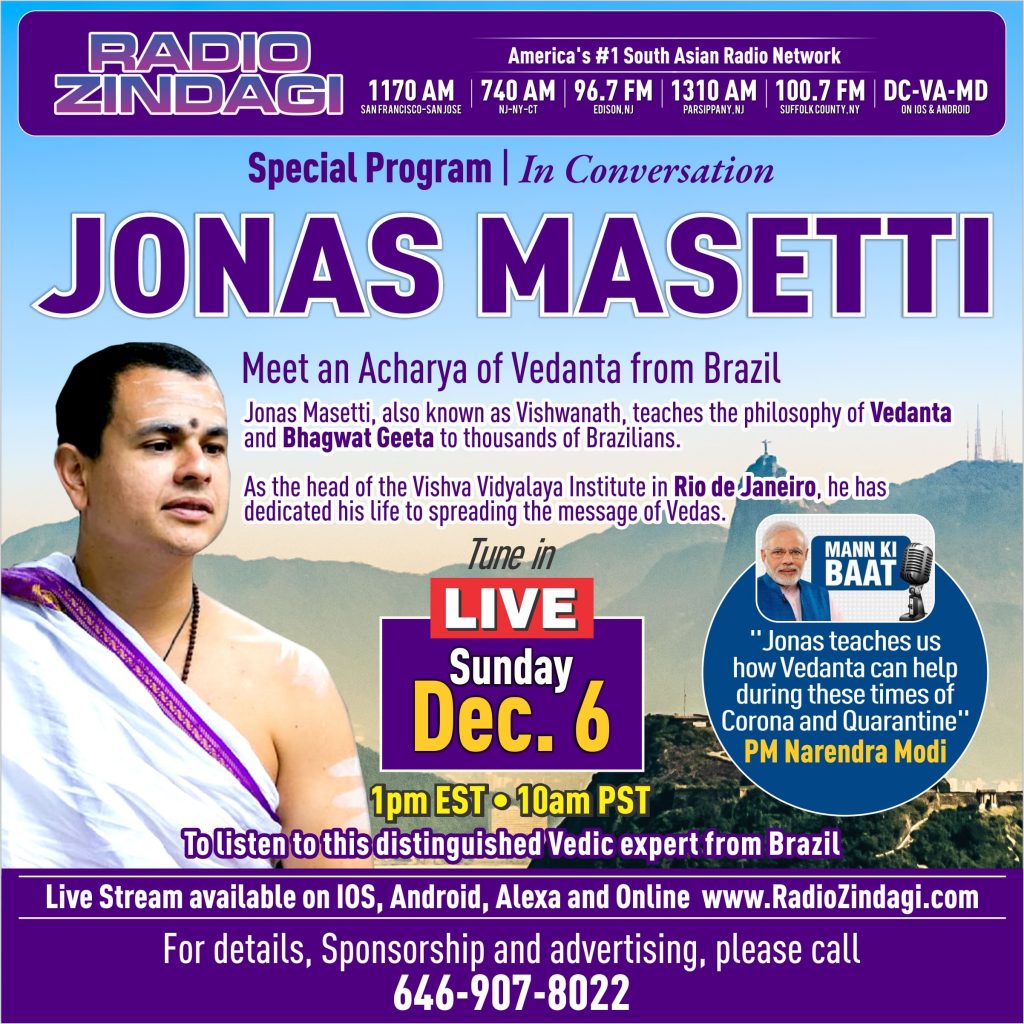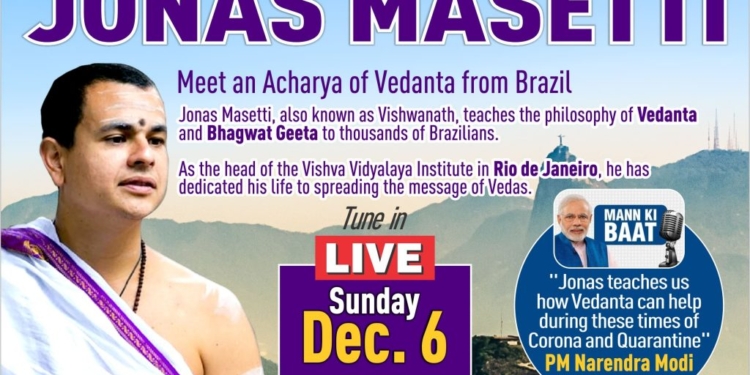Jonas Masetti, also known as Vishwanath, teaches Indian philosophy thousands of Brazilians. He is the head of the Vishva Vidyalaya Institute in Rio de Janeiro, Brazil.He has dedicated his life to spreading the message of Vedas around Brazil and across the world. The distinguished Vedic expert appears on “In Conversation” show of Radio Zindagi on Sunday, December 6.
Our Bureau
Sao Paulo
Addressing the nation in his monthly radio programme ‘Mann Ki Baat’, Prime Minister Narendra Modi highlighted the work and accomplishments of Jonas Masetti, a Brazilian man who has been giving lessons on Vedanta and the Bhagavad Gita in Rio de Janeiro.Speaking about the impact of Indian culture and scripture on people across the world, PM Modi said, “Some people came to India in search of them and stayed here for life. While some returned to their countries as cultural ambassadors of India.”

“I got to know about the work of Jonas Masetti, who is also known as ‘Vishvanath’. Jonas gives lessons on Vedanta and Gita in Brazil,” he went on to explain.
Masetti runs the Vishva Vidya Institute of Vedanta, where Sanskrit, Mantras and Vedic Culture are taught, located in Petrópolis, Rio de Janeiro. Vedanta, as explained by Masetti, who studied the subject for four years in India – is the ancient knowledge that comes from that country and that helps people to find peace and inner balance independent of the outside world. Vishva Vidya means “universal knowledge”, that is, it is aimed at all people of any religion, age, culture and nationality.
He has been giving lectures on Vedanta for quite some time. Some time ago, in the middle of quarantine, he covered a range of topics extensive in an online lecture “The Traditional Teaching of Vedanta in Modern Times, promoted by the Consulate General of India in São Paulo and by the Cultural Center Swami Vivekananda (CCSV).
He spoke about the causes of suffering, the importance of knowing, understanding the role of our mind, the Indian traditions of Ayurveda, yoga, mantras.
Opening the lecture, Amit Mishra, Indian consul-general in São Paulo, explained that this was the first time that the consulate and the CCSV held a joint event with the school of Professor Jonas Masetti. Mishra said he visited the institute last year. “There are three very important components of the study of Indian culture here in Brazil: Yoga, Aiurveda and Vedanta. In the Vedanta field, Professor Masetti is doing a wonderful job in spreading this philosophy in Brazil, ”said Amit Mishra.
Masetti started the chat by explaining that the Vedic tradition is all based on the Vedas, ancient texts from India that bring together a set of knowledge that has been preserved through people today. “It is not something that is in the books and you hear about. People still live this tradition today, it is within the habits and culture ”, he said.
The Vedas are very vast and contain various subjects, such as astrology, mantras, tantra, yoga, aiurveda. “Asanas, the postures of Yoga, for example, come from this same culture called Vedic, from this same group called Vedas. The same tradition that points to astrology, also points to physical exercises that lead to emotional release, to the health of the body, to a more balanced life ”, he said.
Ayurveda, he continued, which means “knowledge of life”, is the part of the Vedas that deals with ancient medicine. “It is a job of harmonizing what you eat, what you do, your daily life, even the way you talk and behave with other people to promote health,” he said.
In the Vedas, the professor explained, there is a call for personal evolution, for awakening, for overcoming suffering. “If we start to analyze the origin, the cause of our suffering in our daily lives, we will realize that this suffering always goes through a structure of self-condemnation. This suffering is coming not because of the action outside. It arises from a conviction inside, ”explained Masetti.
Masetti explained that the study of Vedanta aims to get straight to the point: understanding the subject, that is, what will make a difference to my happiness and to the understanding of who we are.
“There is a very clear incompatibility between our judgment of ourselves and our fundamental desire to be eternally free and happy people in all situations and places. And suffering arises precisely from the difference between these two things. The mind cannot bear to see a world on the outside telling me that I am imperfect and at the same time on the inside I want to live full freedom. This conflict is what causes suffering, ”he said.
“With every step I take in this process of internal analysis, trying to understand what this guy is behind, I am releasing this character from his pains and natural self-condemnations. This process, which is like the flowering of a flower, is Vedanta. We have freed ourselves from a prison that we already carried within us ”, he observed.
Masetti, a mechanical engineer, is the founder of an organisation called ‘Vishva Vidya’, located in the hills of Petrópolis, about an hour away from Rio de Janeiro. It is here that he teaches hundreds of his students about ancient Indian sacred texts, including the Bhagavad Gita and Vedanta. He also teaches Sanskrit, mantras and Vedic culture.
According to him, Brazil is beginning to have an interesting presence in this Vedic tradition because it is a country that has already had access to many religions. “Therefore, we have a very open mind. We can look beyond the clothes, beyond the marks on the forehead, beyond the color ”, he said.
He explained that the Vedic tradition is not a religion in itself. “It makes no difference whether you pray to Christ or to Krishna. This is a tradition of students, of people who dedicate their lives to helping others. It is not a weekend tradition, it is a tradition that is traveling thousands of years to get here ”, he recalled. At the end of the lecture, the students asked several questions. “What are the benefits that the study of Vedanta brings to the practice of Yoga?” Asked one of the listeners.
According to him, Brazil is beginning to have an interesting presence in this Vedic tradition because it is a country that has already had access to many religions. “Therefore, we have a very open mind. We can look beyond the clothes, beyond the marks on the forehead, beyond the color ”, he saidin the online gathering.
Masetti began pursuing a spiritual path while he was still working in the financial market. In the years after he graduated from engineering college, he ran a consultancy firm and worked with several “top management companies”. But he would always ask himself — “How could I have everything in life: family, girlfriend, money, professional success and at the same time not being full and satisfied?”
After seeing that other “successful” people, too, appeared to lack clarity and peace, he turned to spirituality to look for answers. This was when he moved to India and studied Vedanta for four years under the guidance of Swami Dayananda Saraswati.
He explained that the Vedic tradition is not a religion in itself. “It makes no difference whether you pray to Christ or to Krishna. This is a tradition of students, of people who dedicate their lives to helping others. It is not a weekend tradition, it is a tradition that is traveling thousands of years to get here ”, he recalled. At the end of the lecture, the students asked several questions. “What are the benefits that the study of Vedanta brings to the practice of Yoga?” Asked one of the listeners.
“Yoga is very efficient from a physical, health point of view, and it also releases emotional issues that get stuck in the muscles, in the joints. You leave the class very happy and with a very good feeling and this is fertile ground for you to plant afterwards. This plantation is the works of Vedanta. It is the part that changes understandings about yourself. So it’s a perfect complement, ”replied Masetti in the online event.

Another person asked if happiness is possible. “It is possible. But I ask another question: if it were not possible, would it make a difference? Were you going to stop looking for happiness? Whether it is possible or not, we will continue to look for it. Unless I have the conviction that I will succeed, the doors will not open. So happiness is possible, ”he concludedin the online lecture.
With a report from Beco da Índia, a Brazilian website that covers Indian culture in South America
Conteúdo Traduzido
Conheça Jonas Masetti, Acharya da Vedanta e Bhagwat Geeta do Brasil, sobre quem PM Modi falou em seu programa ‘Mann ki Baat’
Jonas Masetti, também conhecido como Vishwanath, ensina filosofia indiana a milhares de brasileiros. Ele é o chefe do Instituto Vishva Vidyalaya no Rio de Janeiro, Brasil. Ele tem dedicado sua vida a espalhar a mensagem dos Vedas pelo Brasil e pelo mundo. O distinto especialista védico aparece no programa “In Conversation” da Rádio Zindagi no domingo, 6 de dezembro.
Nosso Bureau
São paulo
Falando à nação em seu programa mensal de rádio ‘Mann Ki Baat’, o primeiro-ministro Narendra Modi destacou o trabalho e as realizações de Jonas Masetti, um brasileiro que tem dado aulas sobre Vedanta e o Bhagavad Gita no Rio de Janeiro. Falando sobre o impacto da cultura indiana e das escrituras sobre as pessoas em todo o mundo, PM Modi disse: “Algumas pessoas vieram para a Índia em busca deles e permaneceram aqui pelo resto da vida. Enquanto alguns voltaram para seus países como embaixadores culturais da Índia. ”
O primeiro-ministro Modi falou sobre o Acharya em seu programa em 29 de novembro
“Fiquei sabendo da obra de Jonas Masetti, também conhecido como‘ Vishvanath ’. Jonas dá aulas de Vedanta e Gita no Brasil ”, explicou.
Masetti dirige o Instituto Vishva Vidya de Vedanta, onde são ensinados Sânscrito, Mantras e Cultura Védica, localizado em Petrópolis, Rio de Janeiro. O Vedanta, como explica Masetti, que estudou o assunto durante quatro anos na Índia – é o conhecimento milenar que vem daquele país e que ajuda as pessoas a encontrar a paz e o equilíbrio interior independente do mundo exterior. Vishva Vidya significa “conhecimento universal”, ou seja, destina-se a todas as pessoas de qualquer religião, idade, cultura e nacionalidade.
Ele tem dado palestras sobre Vedanta há algum tempo. Há algum tempo, em plena quarentena, abordou uma série de temas extensos na palestra online “O Ensino Tradicional da Vedanta nos Tempos Modernos, promovida pelo Consulado Geral da Índia em São Paulo e pelo Centro Cultural Swami Vivekananda (CCSV )
Ele falou sobre as causas do sofrimento, a importância de conhecer, compreender o papel de nossa mente, as tradições indianas de Ayurveda, ioga, mantras.
Abrindo a palestra, Amit Mishra, cônsul-geral da Índia em São Paulo, explicou que esta foi a primeira vez que o consulado e o CCSV realizaram um evento conjunto com a escola do professor Jonas Masetti. Mishra disse que visitou o instituto no ano passado. “Existem três componentes muito importantes no estudo da cultura indígena aqui no Brasil: Yoga, Aiurveda e Vedanta. No campo da Vedanta, o professor Masetti está fazendo um trabalho maravilhoso na divulgação dessa filosofia no Brasil ”, disse Amit Mishra.
Masetti iniciou a conversa explicando que a tradição védica é toda baseada nos Vedas, textos antigos da Índia que reúnem um conjunto de conhecimentos que hoje é preservado pelas pessoas. “Não é algo que está nos livros e você ouve falar. As pessoas ainda hoje vivem essa tradição, está dentro dos hábitos e da cultura ”, disse.
Os Vedas são muito vastos e contêm vários assuntos, como astrologia, mantras, tantra, ioga, aiurveda. “Asanas, as posturas do Yoga, por exemplo, vêm dessa mesma cultura chamada Védica, desse mesmo grupo chamado Vedas. A mesma tradição que aponta para a astrologia, aponta também para exercícios físicos que levam à liberação emocional, à saúde do corpo, a uma vida mais equilibrada ”, disse.
Ayurveda, continuou ele, que significa “conhecimento da vida”, é a parte dos Vedas que trata da medicina antiga. “É um trabalho harmonizar o que você come, o que faz, o seu dia a dia, até a maneira como você fala e se comporta com outras pessoas para promover a saúde”, disse ele.
Nos Vedas, explica o professor, existe um apelo à evolução pessoal, ao despertar, à superação do sofrimento. “Se começarmos a analisar a origem, a causa do nosso sofrimento no nosso dia a dia, vamos perceber que esse sofrimento sempre passa por uma estrutura de autocondenação. Este sofrimento não vem por causa da ação externa. Surge de uma convicção interna ”, explicou Masetti.
Masetti explicou que o estudo do Vedanta visa ir direto ao ponto: entender o assunto, ou seja, o que fará a diferença para minha felicidade e para a compreensão de quem somos.
“Há uma incompatibilidade muito clara entre nosso julgamento de nós mesmos e nosso desejo fundamental de ser pessoas eternamente livres e felizes em todas as situações e lugares. E o sofrimento surge precisamente da diferença entre essas duas coisas. A mente não suporta ver um mundo externo me dizendo que sou imperfeito e, ao mesmo tempo, por dentro quero viver em plena liberdade. Esse conflito é o que causa sofrimento ”, disse ele.
“A cada passo que dou nesse processo de análise interna, tentando entender o que esse cara está por trás, estou liberando esse personagem de suas dores e autocondenações naturais. Este processo, que é como o desabrochar de uma flor, é Vedanta. Nos libertamos de uma prisão que já carregávamos dentro de nós ”, observou.
Masetti, um engenheiro mecânico, é o fundador de uma organização chamada ‘Vishva Vidya’, localizada na serra de Petrópolis, a cerca de uma hora de distância do Rio de Janeiro. É aqui que ele ensina centenas de seus alunos sobre antigos textos sagrados indianos, incluindo o Bhagavad Gita e o Vedanta. Ele também ensina sânscrito, mantras e cultura védica.
Segundo ele, o Brasil começa a ter uma presença interessante nessa tradição védica por ser um país que já teve acesso a muitas religiões. “Portanto, temos uma mente muito aberta. Podemos olhar além da roupa, além das marcas na testa, além da cor ”, disse.
Ele explicou que a tradição védica não é uma religião em si. “Não faz diferença se você ora a Cristo ou a Krishna. Esta é uma tradição de alunos, de pessoas que dedicam suas vidas a ajudar os outros. Não é uma tradição de fim de semana, é uma tradição que está viajando milhares de anos para chegar aqui ”, lembrou. Ao final da palestra, os alunos fizeram várias perguntas. “Quais são os benefícios que o estudo do Vedanta traz para a prática do Yoga?” Questionado sobre um dos ouvintes.
Segundo ele, o Brasil começa a ter uma presença interessante nessa tradição védica por ser um país que já teve acesso a muitas religiões. “Portanto, temos uma mente muito aberta. Podemos olhar além das roupas, além das marcas na testa, além da cor ”, disse no encontro online.
Masetti começou a seguir um caminho espiritual enquanto ainda trabalhava no mercado financeiro. Nos anos após se formar na faculdade de engenharia, ele dirigiu uma empresa de consultoria e trabalhou com várias “empresas de alta administração”. Mas ele sempre se perguntava – “Como eu poderia ter tudo na vida: família, namorada, dinheiro, sucesso profissional e ao mesmo tempo não estar cheio e satisfeito?”
Depois de ver que outras pessoas “bem-sucedidas” também pareciam carecer de clareza e paz, ele se voltou para a espiritualidade em busca de respostas. Foi quando ele se mudou para a Índia e estudou Vedanta por quatro anos sob a orientação de Swami Dayananda Saraswati.
Ele explicou que a tradição védica não é uma religião em si. “Não faz diferença se você ora a Cristo ou a Krishna. Esta é uma tradição de alunos, de pessoas que dedicam suas vidas a ajudar os outros. Não é uma tradição de fim de semana, é uma tradição que está viajando milhares de anos para chegar aqui ”, lembrou. Ao final da palestra, os alunos fizeram várias perguntas. “Quais são os benefícios que o estudo do Vedanta traz para a prática do Yoga?” Questionado sobre um dos ouvintes.
“O Yoga é muito eficiente do ponto de vista físico, da saúde, e também libera problemas emocionais que ficam presos nos músculos, nas articulações. Você sai da aula muito feliz e com um sentimento muito bom e esse é um terreno fértil para você plantar depois. Esta plantação é obra do Vedanta. É a parte que muda o entendimento sobre você. Portanto, é um complemento perfeito ”, respondeu Masetti no evento online.
Acesse o site Oficial aqui




















